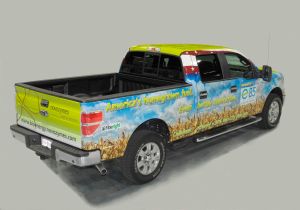The Washington Auto Show is in full swing and for the first time ever, a car is being fueled on government paper waste. The two companies behind this feat are Novozymes and Fiberight. Novozymes has been a partner on many cutting edge biofuels projects so I reached out to both companies to learn a bit more about creating ethanol from paper waste.
 My first question for Fiberight CEO Craig Stuart-Paul was how they selected Novozymes as their project partner. He said that they needed a company that could supply commercial quantities of enzymes for their project and Novozymes was able to do that. However, Stuart-Paul noted that was not the only reason they were selected. The company was very willing and open to working with Fiberight’s technology and came out to their facilities in Blairstown, Iowa and Lawrenceville, VA to see the technology first hand. He also added that the quality and reactivity of Novozymes’ enzymes work well with their substrates and enzyme recycling processes.
My first question for Fiberight CEO Craig Stuart-Paul was how they selected Novozymes as their project partner. He said that they needed a company that could supply commercial quantities of enzymes for their project and Novozymes was able to do that. However, Stuart-Paul noted that was not the only reason they were selected. The company was very willing and open to working with Fiberight’s technology and came out to their facilities in Blairstown, Iowa and Lawrenceville, VA to see the technology first hand. He also added that the quality and reactivity of Novozymes’ enzymes work well with their substrates and enzyme recycling processes.
The specific enzymes that was used in the process were the Cellic CTec and HTec. According to information provided by Novozymes, these are advanced enzymes for hydrolysis of lignocellulosic materials. As the technologies for advanced biofuels are developed, the pilot plants will require significant enzyme volumes and stable formulations to aid the researchers. Cellic CTec and HTec are able to do that and this ability represents a major step towards commercialization of next generations biofuels.
Effective enzymes also help reduce the cost of production – a major barrier for advanced biofuels to overcome in order to be competitive. I asked Stuart-Paul what their current cost per gallon was today, and what he thought it would be as the technology is refined.
“We believe (given the price support discussed) we are below $2.80 per gallon as of today. We believe we will get below $1.50/gal once the plant in Blairstown is running with all unit processes in operation including enzyme recycling,” said Stuart-Paul. “To make this happen we will need to prove that volume production is possible using our pilot plant experience as design basis. Fiberight is fortunate that our Blairstown plant will enable us to prove this during 2010.”

